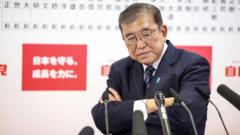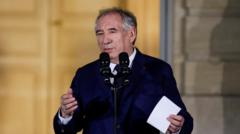Japan's political landscape faces turbulence as Prime Minister Shigeru Ishiba navigates the fallout from his party's poor electoral performance.
Japan's PM Faces Political Uncertainty After Election Setback

Japan's PM Faces Political Uncertainty After Election Setback
Shigeru Ishiba vows to maintain leadership despite significant electoral losses for the ruling party.
Japan's Prime Minister Shigeru Ishiba, who recently assumed office, faces a significant political crisis following the Liberal Democratic Party's (LDP) shocking loss in the recent general election. The LDP, under his leadership, has seen its parliamentary majority evaporate, marking its worst electoral outcome in over a decade. Just a short time after taking office, Ishiba called a snap election in hopes of solidifying his mandate, but instead, he received what he termed "severe judgement" from voters—a clear indication of public discontent.
In an address on state television, Ishiba acknowledged the people's strong desire for the LDP to introspect and align itself more closely with citizen sentiments. The party, along with its smaller coalition partner, Komeito, ended the election with 215 seats—well below the 233 needed for an outright majority. This marks the first time the long-dominant LDP has lost its parliamentary majority since 2009, a stark contrast from its nearly unbroken rule since 1955.
The electoral defeat comes on the heels of troubling times for the LDP, including a series of scandals and a notable decline in popularity, with approval ratings dipping below 20% due to controversies like a political fundraising corruption scandal. In response, Ishiba committed to undertaking significant reforms concerning "money and politics," claiming accountability for the electoral loss, and promising to revitalize rural communities and address inflation.
Japan’s parliament will reconvene in 30 days to select a prime minister, with the complex dynamics suggesting Ishiba may remain in power despite lacking a majority—a scenario that could hinder unilateral lawmaking. Alternatively, the largest opposition party, the Constitutional Democratic Party (CDP), could attempt to unite and form a government, having gained seats in the election. However, historical challenges to collaboration among opposition forces make this an unlikely outcome. The CDP itself had an approval rating of just 6.6% prior to the dissolution of parliament.
This electoral upheaval in Japan comes after a period of rapid political changes, including Ishiba's elevation to leadership following a sudden resignation from former Prime Minister Fumio Kishida. The call for an election reflects the LDP's urgent need to rectify its damaged public image, following troubling ties to controversies, including its connections with the contentious Unification Church and various slush fund scandals leading to investigations of numerous lawmakers.
As Japan's political climate becomes increasingly complex, whether Ishiba can regain public trust amid challenges from within his party and a disorganized opposition remains to be seen.
In an address on state television, Ishiba acknowledged the people's strong desire for the LDP to introspect and align itself more closely with citizen sentiments. The party, along with its smaller coalition partner, Komeito, ended the election with 215 seats—well below the 233 needed for an outright majority. This marks the first time the long-dominant LDP has lost its parliamentary majority since 2009, a stark contrast from its nearly unbroken rule since 1955.
The electoral defeat comes on the heels of troubling times for the LDP, including a series of scandals and a notable decline in popularity, with approval ratings dipping below 20% due to controversies like a political fundraising corruption scandal. In response, Ishiba committed to undertaking significant reforms concerning "money and politics," claiming accountability for the electoral loss, and promising to revitalize rural communities and address inflation.
Japan’s parliament will reconvene in 30 days to select a prime minister, with the complex dynamics suggesting Ishiba may remain in power despite lacking a majority—a scenario that could hinder unilateral lawmaking. Alternatively, the largest opposition party, the Constitutional Democratic Party (CDP), could attempt to unite and form a government, having gained seats in the election. However, historical challenges to collaboration among opposition forces make this an unlikely outcome. The CDP itself had an approval rating of just 6.6% prior to the dissolution of parliament.
This electoral upheaval in Japan comes after a period of rapid political changes, including Ishiba's elevation to leadership following a sudden resignation from former Prime Minister Fumio Kishida. The call for an election reflects the LDP's urgent need to rectify its damaged public image, following troubling ties to controversies, including its connections with the contentious Unification Church and various slush fund scandals leading to investigations of numerous lawmakers.
As Japan's political climate becomes increasingly complex, whether Ishiba can regain public trust amid challenges from within his party and a disorganized opposition remains to be seen.






















